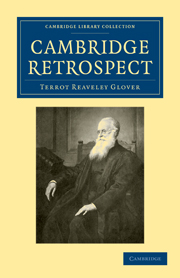Chapter IV - High Table
Published online by Cambridge University Press: 07 September 2010
Summary
In my first chapter I have looked back over the centuries of Cambridge. In my second and third I have tried to picture the men I found here—the men who were to educate me. I now turn to the High Table, which I reached in November 1892, and attempt a further series of portraits of men who were really older, most of them, than our lecturers.
Of the older generation who survived into our days, quite the oddest was Peter Hamnett Mason, the President of the College and lecturer in Hebrew. He had written a Hebrew grammar in the form of ‘Letters to a Duchess’. Duchesses may now and then wish to learn Hebrew, like the retired Scottish grocer who thought it might be fitting for him to learn to address the Creator in His own language. Peter's duchess appears to have been imaginary, or at most (legend said) his cat. But there the book was, and he had enlisted the enthusiasm of his pupils. For when the Regius Professorship of Hebrew became vacant, and the electors, not quite unintelligibly, fought shy of the queer old man and elected a much less picturesque figure, a Trinity man, who held the post for many years, Peter's pupils rose in indignation, levied contributions on one another and themselves, and founded a University prize to perpetuate the old man's memory, the Mason Prize for Biblical Hebrew.
- Type
- Chapter
- Information
- Cambridge Retrospect , pp. 81 - 103Publisher: Cambridge University PressPrint publication year: 2009First published in: 1943



